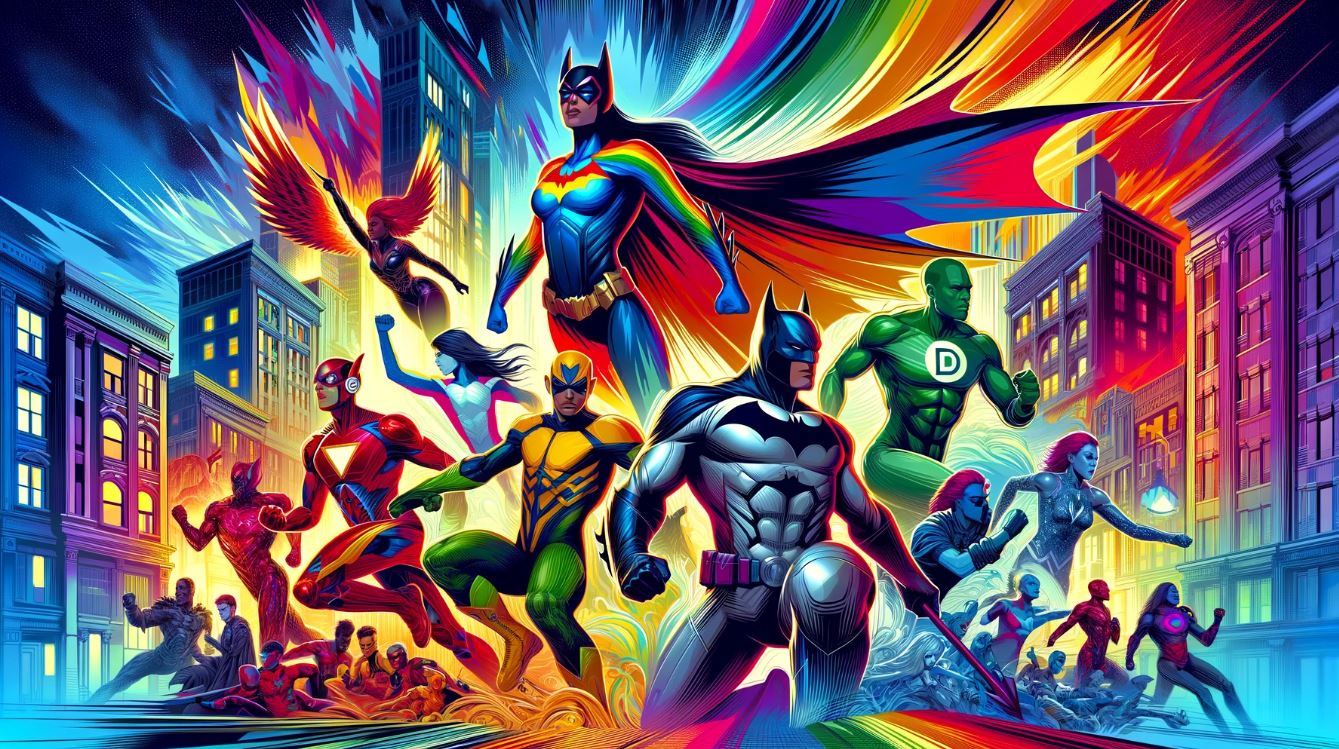The Evolution of LGBT Superheroes in Comic Books
Comic Books: A Platform for Diversity
Comic books, the birthplace of superheroes, have long reflected stereotypes and traditional norms. However, over the decades, they began to include LGBT characters, offering a more diverse representation. Characters like Batwoman, Iceman, and Midnighter are some notable examples of this evolution.
Superman (Jon Kent): Embracing Bisexuality
Clark Kent’s son, Jon Kent, is introduced as bisexual in a new comic book. He falls in love with a journalist, marking a significant turning point for this iconic character.
Miss America (America Chavez) : Breaking Barriers
Miss America, also known as America Chavez, is Marvel’s first lesbian and Hispanic superhero to have her own series. Raised by two mothers in a parallel world, she fights alongside other young LGBTQ+ heroes.
Loki : Beyond Gender Norms
Thor’s half-brother, Loki, is revealed to be bisexual and gender fluid in his Disney+ series. This revelation is made to a female version of himself.
Captain America (Aaron Fisher) : A New Legacy
To celebrate 80 years of Captain America, Marvel introduced Aaron Fisher, an openly gay character, in the limited series “The United States of Captain America.”
Aquaman (Kaldur’Ahm) : Underwater Revelation
In the animated series “Young Justice: Outsiders,” Kaldur’Ahm, also known as Aquaman, reveals his homosexuality.
Robin : Exploring Bisexuality
Batman’s faithful sidekick, Robin, explores his bisexuality in “Batman: Urban Legends,” accepting a date with an old friend.
Batwoman : A TV Revolution
The CW’s “Batwoman” TV series highlights the main character’s homosexuality, initially portrayed by Ruby Rose and then by Javicia Leslie.
Notable Examples of LGBT Characters in Comic Books
Batwoman (Katherine Kane) : Pioneering Heroine
An openly lesbian character, Batwoman was one of the first leading LGBT superheroes in the DC universe.
Iceman (Bobby Drake) : X-Men’s Pride
A member of the X-Men, Iceman came out as gay, adding a new dimension to his character.
Midnighter : Breaking the Mold
This openly gay superhero is known for his relationship with Apollo, evoking an alternative version of Superman and Batman.
LGBT Superheroes in Cinema and Television
Emerging on the Big Screen
Cinema and television have also begun to integrate LGBT superheroes, although more timidly compared to comic books. Series like “The Umbrella Academy” and films like “Deadpool 2” have introduced LGBT characters, thus expanding diversity in superhero adaptations.
LGBT Superheroes in Recent Productions
“The Umbrella Academy” : A New Narrative
With characters like Klaus and Vanya, the series addresses LGBT themes while focusing on action and adventure.
“Deadpool 2” : Introducing Negasonic
The film introduced Negasonic Teenage Warhead, an openly lesbian superheroine.
Conclusion : A New Era of Inclusivity
The growing presence of LGBT superheroes in the media is a positive step towards more inclusive and diverse representation. This evolution not only reflects social changes but also enriches the world of superheroes with more nuanced and realistic stories and characters.
LGBT Superheroes FAQ
The Dawn of LGBT Representation
Q: When did the first LGBT superhero appear in comic books? A: The first appearances of LGBT characters in comic books date back to the 80s and 90s, but it was in the early 2000s that their presence began to be significant.
Impact on Society
Q: How does the representation of LGBT superheroes influence society? A: The representation of LGBT superheroes in the media can promote acceptance and understanding of sexual and gender diversity, normalizing these themes in popular culture.
Controversy and Conversation
Q: Have there been controversies around the inclusion of LGBT characters in superhero universes? A: Yes, some decisions to include LGBT characters in comic books and adaptations have sparked debates and controversies, reflecting different perspectives on diversity and inclusion in society.














+ There are no comments
Add yours